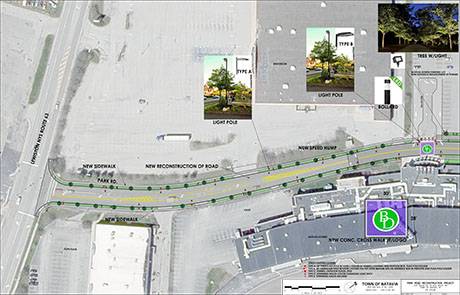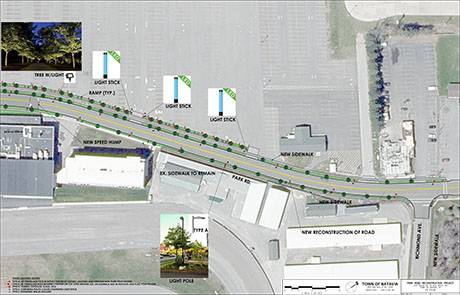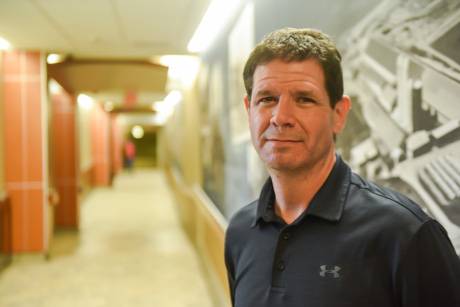WROTB to pay town up to $395K for facility enhancements in connection with Park Road project

Directors of the Western Regional Off-Track Betting Corp. this morning voted in favor of paying the Town of Batavia up to $395,000 for property enhancements as part of the Park Road Reconstruction Project that is scheduled to commence construction this fall.
Following the approval at the board’s monthly meeting at Batavia Downs Gaming, WROTB President/CEO Henry Wojtaszek said he was impressed with Town officials’ diligence in making the $3 million street reconstruction a reality and is eager to see the finished product.
“This will be a beautiful entry to our facility,” Wojtaszek said. “We’re talking about sidewalks, a promenade, tree-lined area, street and parking lot lighting, landscaping, road work, valet improvements for hotel purposes and some infrastructure work.
“We had a great meeting with them (town officials). They were very well prepared and they had excellent documents.”
Wojtaszek said that “every bit of the project is very well thought out,” noting that work will be done on one side of the street at a time to keep traffic moving – although at a slower pace. “The town is going to improve the speed bumps that we have, and that will help, also.”
Last June, WROTB granted the town three easements – small parcels to help facilitate drainage, utilities and sidewalk installation.
The major rehabilitation of the road will take place from Lewiston Road (Route 63) to Oak Street (Route 98).
Work will include new pavement, curbs and curbing from Lewiston Road to Richmond Avenue with sidewalks on both sides of Park Road, while pavement will be overlaid and sidewalks installed on one side of the road from Richmond Avenue to Route 98. The project also calls for new water lines and street lights on Park Road between Route 63 and Richmond Avenue.
Town Engineer Steve Mountain said WROTB’s request for “betterments” is typical of road projects in urban areas.
“If somebody wants additional streetscape and improvements to enhance the functionality of their facility – such as Batavia Downs – than oftentimes betterment improvements are performed,” Mountain said. “Things like additional lighting, surface treatments, walkways, landscaping and trees. They’re kind of above and beyond what we would normally do.”
Mountain said that the state-funded project is in its design phase and that the town is hoping to solicit bids in August.
“We’re waiting on our grant application for the water main,” he said. “Depending upon the results of that, replacement of the water main is out ahead of the road project.”
Last month, the Batavia Town Board approved a resolution to apply for a state Community Development Block Grant for around $900,000 to replace a 5,300-foot stretch of water main on Park Road.
Mountain said the plan is to remove the 50-year-old asbestos water main under the roadway that serves Batavia Downs Gaming and other commercial enterprises. The pipe runs along the length of Park Road from Route 63 to the gas station on Park Road, not far from Route 98.
In other developments:
- Chief Financial Officer Jacquelyne Leach reported that the corporation will distribute $66,500 in surcharge to member municipalities for February, despite an operating loss of about $115,000 for the month.
Branch operations declined by about $73,000 in February. As of March 16, however, revenue was up by more than $900,000 compared to that time in 2020, which happened to be the first week of the COVID-19 shutdown.
Batavia Bets, the corporation’s interactive online platform, had a handle of $1.4 million in February, up $354,000, and through March 21, revenue is up by $383,000. Year to date, Batavia Bets’ proceeds are $4 million, a 50 percent increase.
- Directors approved four other spending measures:
$400,000 to Bally’s Casino Marketplace for the installation of a video lottery gaming player tracker and update of related hardware and software;
$55,000 to Kim Crawford for consulting services in respect to the resurfacing and maintenance of the harness horse racing track;
$16,500 to the William Ryan Group, Inc., for an application (app) that will alert gaming personnel when a machine or patron needs assistance;
$21,350 to United Tote Company for a horse racing ticket cashing kiosk.
- Marketing Director Ryan Hasenauer announced that Batavia Downs Gaming is attempting to bring in two more concerts outside of the nine-concert Rockin’ the Downs series. Hasenauer said a first-rate tribute band is likely to perform on May 22, followed by a nationally-known artist sometime in July.




